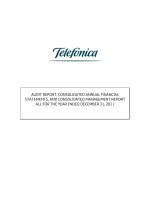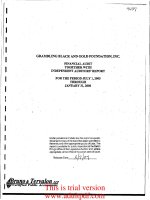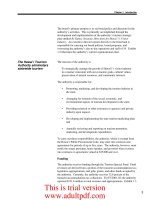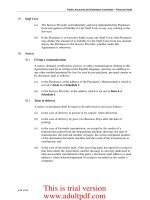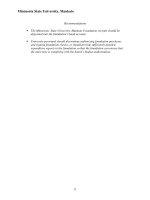Capitol Area Architectural and Planning Board . Financial-Related Audit For the Period July 1, 1995, through June 30, 1999 _part2 docx
Bạn đang xem bản rút gọn của tài liệu. Xem và tải ngay bản đầy đủ của tài liệu tại đây (40.85 KB, 11 trang )
Capitol Area Architectural and Planning Board
8
Table 3-1 shows the amount the board paid advisors and other consultants for professional
services and payments made to board members and advisors for per diems.
Table 3-1
Professional Services and Per Diem Expenditures
Fiscal Years 1996-1999
Payment Type Amount
Professional Services by Advisors $ 15,474
Professional Services by Others (1) 274,619
Total Professional Services $290,092
Board Member Per Diems $ 4,740
Advisory Committee Per Diems 11,495
Total Per Diems $ 16,235
(1): Of this amount, $120,000 was paid to an architectural partnership for work on Comprehensive Plan revisions.
Source: Minnesota Accounting and Procurement System (MAPS) data.
Audit Objectives and Methodology
The primary objectives of our audit of professional/technical services were to answer the
following questions:
• Did the Capitol Area Architectural and Planning Board administer its professional
technical service contracts in a prudent and reasonable manner?
• Did the board comply with significant finance-related legal provisions and board policy
when making payments to board advisors and to others?
The primary objectives of our audit of per diems were to answer the following questions:
• Were per diem payments paid to board members and advisors at a rate authorized in state
law and board policy?
• Were per diem payments supported by appropriate documentation?
To meet these objectives, we interviewed board employees to gain an understanding of the
professional/technical service expenditure process and the per diem payment process. We
reviewed the types of expenditures made for professional/technical services. We also tested a
sample of transactions to determine the appropriateness of payments.
Capitol Area Architectural and Planning Board
9
Conclusions
The Capitol Area Architectural and Planning Board accurately reported professional technical
service expenditures in the accounting records. The board made per diem payments at a rate
authorized in state law and applicable board policy. However, as discussed in the Findings
below, the board did not provide adequate control over the role and compensation of the
Advisory Committee.
3. The board did not clearly define the role of the advisors in some situations.
The board has not sufficiently clarified the advisor’s role and responsibilities in some situations.
For example, the executive secretary and an advisor made a work-related trip to New York City
to attend a convention. During the trip the board paid the advisor an hourly rate of $50 for
professional/technical services, totaling $950. However, the board also paid this advisor a daily
$55 per diem for the same activity. It is unclear as to whether the individual was functioning as a
consultant (paid per contract) or as an advisor (paid per diem per policy) during this trip. In
another case, the board paid an advisor $500 for serving on a design competition jury when the
advisor was subject to advisor per diem.
In other situations, the board did not specify in advance the particular work to be performed by
advisors and other professional service consultants. The board and the consultants signed broad,
general contracts that required the consultants to “provide professional services on a work-order
basis as requested by the state on architectural and planning matters.” These contracts should be
supplemented with detailed work plans, specifically citing the work to be done on particular
projects. Without advance work plans indicating services to be performed, it is difficult to
monitor whether the contractors have achieved their objectives.
Recommendations
• The board should clearly define the role of its advisors. Advisors should not
be allowed to function as a part of the advisory committee and as a paid
consultant simultaneously.
• The board should complete detailed work orders for the specific work projects
done under a general contract.
• The board should seek repayment of the advisor’s per diems during the trip to
New York City.
4. The board did not comply with contract provisions when compensating advisory
committee members for certain professional consulting services.
The board made inappropriate contract payments to two advisors. In one instance, the board
overpaid an advisor. In three other instances, the board paid an advisor for work completed
outside of the contractual time period terms.
Capitol Area Architectural and Planning Board
10
The board paid an advisor $221 more than the fiscal year 1997 contract entitled him to receive.
The fiscal year 1997 contract specified that payment was limited to $1,000. For work performed
from November 1996 until January 1997, the advisor received $1,221 for professional/technical
services. The board did not amend the original contract to allow for the additional payments.
In the other cases, the board made payments totaling $4,063 for work performed outside the time
period of the contract. The board made three payments to an advisor for $2,413, $770, and $880
for work completed under two different contracts. The contract term was from June 3, 1996,
through June 30, 1996. According to documentation submitted by the advisor, the work was
performed during April, May, August, and September of 1996.
Recommendation
• The board should comply with the terms of its professional service contracts.
If necessary, the board should make the appropriate amendments to contracts.
5. The board overpaid advisor per diems in some cases.
The board paid advisors multiple per diem payments for one day’s activities. We also noted a
lack of documentation for certain advisor per diem and other expenditures. The board policy for
advisor per diems allows $55/day per diem plus mileage for all board meetings and $55/day per
diem plus mileage for all in-office consultations.
The board granted some advisors multiple per diems within a single day. The board granted an
advisor one per diem payment of $55 for July 9,1997, and three per diem payments of $55 each
for activities on July 10, 1997. The board paid another advisor two per diems of $55 for
activities on July 21, 1998.
In addition, the board failed to adequately document instances of “in-office consultation” by
advisors. Often, the documentation consisted of a note indicating “office meeting,” without any
indication of the type and scope of the meeting, or who attended. Documentation of these
sessions is important in order to verify that the meetings were legitimate and that work was
actually completed.
Recommendations
• The board should limit per diem payments to a maximum of one per day.
• The board should clarify which office consultations qualify for per diem
payments and make sure that all office consultations are adequately
documented.
• The board should seek repayments from advisors who received multiple per
diems in a single day.
Capitol Area Architectural and Planning Board
11
Chapter 4. Payroll Expenditures
Chapter Conclusions
The Capitol Area Architectural and Planning Board appropriately processed
and recorded payroll expenditure transactions. For the items tested, the board
also complied with applicable finance-related provisions of state bargaining
unit agreements, including separation payments.
The Capitol Area Architectural and Planning Board currently employs four full-time employees.
The positions (executive secretary, planner principal, administrative specialist, and program
administrator) are covered under various state bargaining agreements.
Payroll expenditures comprised over 60 percent of total office expenditures, totaling $884,981
for the four fiscal years ending June 30, 1999. Table 4-1 shows the total amounts of payroll by
type for the audit period.
Table 4-1
Payroll Expenditures
Fiscal Years 1996 through 1999
1996
1997
1998
1999
Full-time Salaries $180,538 $234,976 $220,412 $215,965
Overtime Pay
0
139
100
0
Severance
0
12,543
5,960
0
Other 791 3,719 6,614 3,224
Total
$181,329
$251,377
$233,086
$219,189
Source: Auditor summary of Minnesota Accounting and Procurement System (MAPS) data for budget fiscal years 1996 – 1999.
Audit Objectives and Methodology
The primary objectives of our audit were to answer the following questions:
• Did the board office have an effective process in place to ensure that payroll transactions
were accurately recorded on the state’s accounting system?
• Were employees paid in accordance with material finance-related provisions of state
bargaining unit agreements, including separation payments?
To meet these objectives, we interviewed office employees to gain an understanding of the
payroll and personnel process. We analyzed payroll expenditure levels to determine proper
recording of payroll transactions. We also reviewed salaries and separation payments to ensure
proper payment pursuant to contract provisions.
Capitol Area Architectural and Planning Board
12
Conclusions
The Capitol Area Architectural and Planning Board appropriately processed and recorded payroll
expenditure transactions. For the items tested, the board also complied with applicable finance-
related provisions of state bargaining unit agreements.
Capitol Area Architectural and Planning Board
13
Status of Prior Audit Issues
As of July 20, 1999
Most Recent Audits
May 19, 1995, Legislative Audit Report 95-22 covered the three years ended June 30, 1994.
That audit scope included a review of project and administrative expenditures. This report
included eight reportable findings. The board resolved all but one of these issues. The
remaining issue relates to our recommendation that the board establish an advisory committee
policy. We recommended that this policy set terms, establish appropriate compensation, and
prohibit advisory committee members from providing contractual services for board projects.
The board did establish a policy that sets terms and establishes compensation for the members of
its advisory committee. It has not, however, prohibited advisory committee members from
providing contractual services to the board. See related Findings 3, 4, and 5 in Chapter 3.
May 19, 1995, Legislative Audit Report 95-23 was a special review report of certain activities
of the former executive secretary of the Capitol Area Architectural and Planning Board. The
objectives of the review were to determine whether the former executive secretary received
personal benefits from traveling on state business and whether he inappropriately maintained a
second set of financial records for the Minnesota Vietnam Veterans Memorial project. Although
he denied any liability for the $3,387 in overpayments identified, the state recovered $1,150 from
the former executive secretary as a result of the special review report.
State of Minnesota Audit Follow-Up Process
The Department of Finance, on behalf of the Governor, maintains a quarterly process for following
up on issues cited in financial audit reports issued by the Legislative Auditor. The process consists
of an exchange of written correspondence that documents the status of audit findings. The follow-
up process continues until Finance is satisfied that the issues have been resolved. It covers entities
headed by gubernatorial appointees, including most state agencies, boards, commissions, and
Minnesota state colleges and universities. It is not applied to audits of the University of Minnesota,
any quasi-state organizations, such as the metropolitan agencies or the State Agricultural Society,
the state constitutional officers, or the judicial branch.
Capitol Area Architectural and Planning Board
14
This page intentionally left blank.
Capitol Area Architectural and Planning Board
204 Administration Building
50 Sherburne Avenue
Saint Paul, Minnesota 55155
Phone: 651.296.7138
Fax: 651.296.6718
TTY: 800.627.3529
September 22, 1999
Ms. Jeanine Leifeld, CPA
Audit Manager
Office of the Legislative Auditor
Centennial Office Building, First Floor
658 Cedar Street
St. Paul, Minnesota 55155
Dear Ms. Leifeld,
Thank you for the opportunity to review and comment on the Capitol Area Architectural and
Planning Board’s draft financial audit for the period of July 1, 1995 through June 30, 1999.
The attached response is keyed to your draft findings and recommendations. This response
outlines our current or proposed compliance.
We will provide you with an electronic copy of our response, as requested. Please contact me if
you should have any questions.
Sincerely,
Nancy Stark
Executive Secretary
c: Lt. Governor Mae Schunk, Chair CAAPB
NS:rnd
CURRENT FINDINGS AND RECOMMENDATIONS
Audit for Fiscal Years 1996 – 1999
for the Capitol Area Architectural and Planning Board
FINDING #1
1. The board miscoded certain transactions on the state’s accounting system.
Response
The CAAPB agrees with this finding.
• Administration’s Real Estate Management Division prior to July 1997 (fiscal years 1996 and
1997) input the coding of space rental. The responsibility of entering lease contracts was
given to each agency at that time. In one of the two following years improper coding did
occur. We have since coded space rental properly and feel we are in compliance with the
recommendation.
• The improvement and construction coding errors occurred in Administration’s Building
Construction Division.
• Any design competition transactions in the future will follow state coding criteria with some
assistance from Administration’s Material Management Division.
We feel that the Minnesota Procurement and Accounting System (MAPS) training lacked some
clarity in certain areas. The report’s findings acknowledge that both agencies had difficulties in
the early years of the audit but have since made an effort to comply with the recommendation.
FINDING #2
2. One board member did not file an Economic Interest Statement as required by law.
Response
The CAAPB agrees with this finding. We will implement the policy of copying the Campaign
Finance and Public Disclosure Board on every notice of appointment (gubernatorial and
mayoral). We agree with the report’s recommendation and have begun implementation.
FINDING #3
3. The board did not clearly define the role of the advisors in some situations.
Response
The CAAPB agrees with this finding. We will implement documentation that more clearly defines
the role of an advisor on a specific project, and thus compensation of the advisor is compatible
with the role as defined. Role definition will prevent advisors functioning as a CAAPB advisor
and a paid consultant simultaneously. An advisor on a design competition jury will assume the
role of a paid consultant with a detailed work order done under a general contract.
Operations that resulted in these discrepancies will be changed. We will pay back any amount
owed.
FINDING #4
4. The board did not comply with contract provisions when compensating advisory
committee members’ for certain professional consulting services.
Response
The CAAPB agrees with this finding. We will monitor the professional service contracts of the
advisors, based on their defined role, and request monthly invoicing. For services that expand in
scope or schedules, the professional service contracts will be amended.
FINDING #5
5. The board overpaid advisor per diems in some cases.
Response
The CAAPB agrees with this finding. “In-office consultation” by CAAPB advisors has always
been legitimate professional work. We will continue the practice of documenting such meetings
with agendas and actions or recommendations by the advisors to the CAAPB. We will limit per
diem payments to advisors to a maximum of one per day, and repay any amounts owed from
multiple per diems per day.
a:audit response s16
